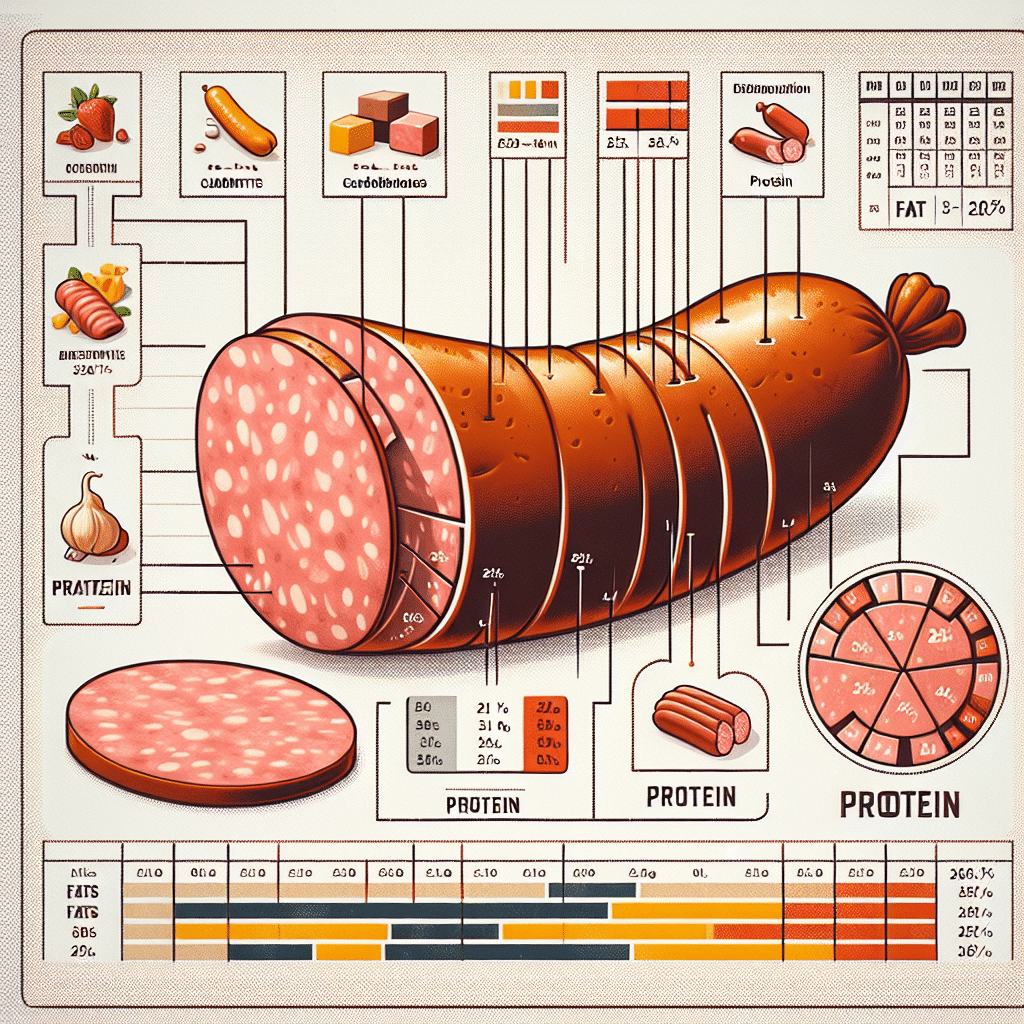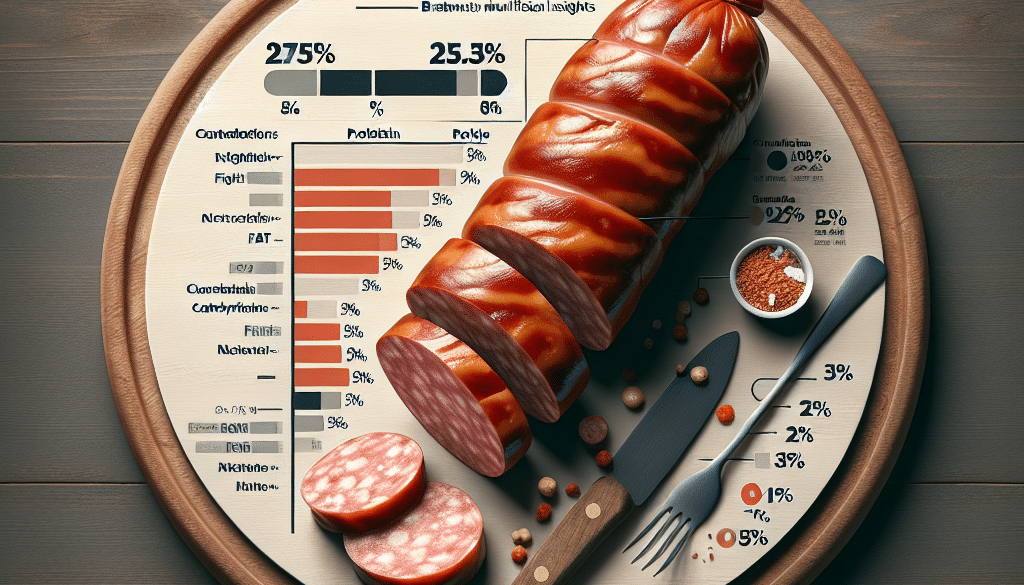Protein in a Brat: Nutritional Insights
-
Table of Contents
- Protein Powerhouse: Nutritional Insights into Bratwurst Sausages
- Understanding the Protein Content in Bratwurst
- Comparative Analysis of Bratwurst Protein
- Health Considerations and Dietary Balance
- Bratwurst in Different Diets
- Cooking Methods and Nutritional Impact
- Bratwurst in Culinary Traditions
- Conclusion: Balancing Flavor and Nutrition
- Discover ETprotein’s High-Quality Protein Products
Protein Powerhouse: Nutritional Insights into Bratwurst Sausages

Bratwurst, commonly known as ‘brat’, is a type of German sausage made from pork, beef, or veal. The name is derived from the Old High German Brätwurst, from brät-, which is finely chopped meat, and Wurst, or sausage. Though it is one of the oldest forms of processed food, bratwurst has remained a popular choice worldwide, especially for its rich flavor and versatility in various dishes. But beyond its taste, the nutritional content, particularly its protein value, is of significant interest to health-conscious individuals and those looking to maintain a balanced diet.
Understanding the Protein Content in Bratwurst
Protein is a crucial macronutrient necessary for building muscle mass, repairing tissues, and producing enzymes and hormones. Bratwurst can be a good source of protein, but the exact content can vary depending on the ingredients and preparation methods. On average, a single bratwurst sausage can contain between 15 to 20 grams of protein. However, it’s important to consider the complete nutritional profile, including fat and calorie content, to make informed dietary choices.
Comparative Analysis of Bratwurst Protein
When compared to other protein sources, bratwurst can hold its own, especially against other meats. For instance, a chicken breast may offer more protein per serving, but bratwurst provides a unique set of flavors and culinary experiences. It’s also worth noting that the type of protein found in bratwurst, which is animal-based, contains all nine essential amino acids required by the body, making it a complete protein source.
Health Considerations and Dietary Balance
While bratwurst can be part of a protein-rich diet, it’s essential to balance its intake with other health considerations. Bratwurst is also high in saturated fats and sodium, which can lead to health issues if consumed in excess. It’s advisable to enjoy bratwurst in moderation, paired with a variety of vegetables and whole grains to create a well-rounded meal.
Bratwurst in Different Diets
For those following specific dietary patterns, such as low-carb or ketogenic diets, bratwurst can be an appropriate choice due to its high protein and fat content and low carbohydrate levels. However, for individuals on a low-fat or heart-healthy diet, leaner protein sources may be more suitable.
Cooking Methods and Nutritional Impact
The way bratwurst is prepared can also affect its nutritional value. Grilling or baking bratwurst instead of frying can help reduce added fats. Additionally, choosing bratwurst made with leaner cuts of meat or alternative ingredients like turkey can offer a healthier option with a similar protein content.
Bratwurst in Culinary Traditions
Bratwurst is not only a staple in German cuisine but has also found its way into various culinary traditions around the world. It’s commonly served in a bun with sauerkraut and mustard or used in stews and casseroles. Each preparation method can contribute to the overall nutritional value of the meal.
Conclusion: Balancing Flavor and Nutrition
In conclusion, bratwurst can be a delicious and protein-rich addition to a balanced diet when consumed in moderation and prepared healthily. By understanding the nutritional content and considering the broader dietary context, individuals can enjoy bratwurst as part of a diverse and nutritious meal plan.
Discover ETprotein’s High-Quality Protein Products
If you’re looking to incorporate more protein into your diet, ETprotein offers a range of plant-based protein products that can complement your nutritional needs. Whether you’re a vegetarian, vegan, or simply seeking alternative protein sources, ETprotein’s organic and non-GMO options provide a healthy and sustainable choice.
About ETprotein:
ETprotein, a reputable plant protein vegan protein Chinese factory manufacturer and supplier, is renowned for producing, stocking, exporting, and delivering the highest quality organic bulk vegan protein and plant proteins. They include Organic rice protein, clear rice protein, pea protein, clear pea protein, watermelon seed protein, pumpkin seed protein, sunflower seed protein, mung bean protein, peanut protein etc. Their offerings, characterized by a neutral taste, non-GMO, allergen-free attributes, cater to a diverse range of industries. They serve nutraceutical, pharmaceutical, cosmeceutical, veterinary, as well as food and beverage finished product distributors, traders, and manufacturers across Europe, USA, Canada, Australia, Thailand, Japan, Korea, Brazil, and Chile, among others.
ETprotein specialization includes exporting and delivering tailor-made protein powder and finished nutritional supplements. Their extensive product range covers sectors like Food and Beverage, Sports Nutrition, Weight Management, Dietary Supplements, Health and Wellness Products, and Infant Formula, ensuring comprehensive solutions to meet all your protein needs.
As a trusted company by leading global food and beverage brands and Fortune 500 companies, ETprotein reinforces China’s reputation in the global arena. For more information or to sample their products, please contact them and email sales(at)ETprotein.com today.












